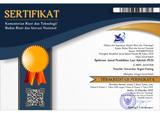Description of Experimental Methods in Knitting Skills Training at Karang Taruna Batuang Sarumpun
 ), Alim Harun Pamungkas(2),
), Alim Harun Pamungkas(2), (1) Universitas Negeri Padang
(2) Universitas Negeri Padang
 Corresponding Author
Corresponding Author
DOI : https://doi.org/10.24036/spektrumpls.v2i3.106190
Full Text:
 Language : en
Language : en
Abstract
This research is motivated by success Karang Taruna Batuang Sarumpun in carrying out training activities. This can be seen from the high interest of learning citizens to attend training activities, the availability of adequate learning places, varied learning methods. The purpose of this study is to describe the activities of implementing the experimental method the activities of knitting skills training in Karang Taruna Batuang Sarumpun based on preparatory activities, implementation activities, and closing activities. This type of research is a quantitative descriptive. Population in this study all participants who participated in knitting training activities in Karang Taruna Batuang Sarumpun of 20 people. The sampling technique uses simple random sampling, where the sample was taken as much as 90% of the total population of 18 people. Data collection techniques using a questionnaire that is based on a Likert scale. While data analysis uses the percentage formula. The results of the study found that (1) the implementation of preparatory activities in the practice of knitting skills training is included in both categories; (2) implementation activities in the practice of knitting skills training are included in both categories; (3) implementation of closing activities on the practice of knitting skills included in both categories. Suggestions from this research are expected to the institution KarangTaruna Batuang Sarumpun to always try to improve facilities both physically and non- physically as an effort to improve and develop the quality of the institution for the future.
Keywords: Learning Methods, Karang Taruna, Knitting Training, Experimental Method
References
Aini, W. (2006). Konsep Pendidikan Luar Sekolah (Buku Ajar). UNP: PLS FIP.
Darmansyah. (2017). Strategi Pembelajaran. Padang: Penertbit Erka.
Haryanto. (2009). Optimalisasi Penerapan Konsep Andragogi Dalam Pendidikan dan Pelatihan Aparatur Pemerintah Sebagai Upaya Peningkatan Mutu Lulus. Ilmiah Visi PTK-PNF, 4(2).
Pamungkas, A. H., Sunarti, V., & Wahyudi, W. A. (2018). Peran PKBM dalam Peningkatan Pertumbuhan Ekonomi dan Kesejahteraan Hidup Masyarakat Sesuai Target SDGs. SPEKTRUM: Jurnal Pendidikan Luar Sekolah (PLS), 1(3), 301–307. https://doi.org/10.24036/spektrumpls.v1i3.101240
Rosani. (2014). Pengembangan Model Pelatihan Kolabaratif Dengan Pendampingan Intensif Untuk Meningatkan Kemampuan Penelitian Tindakan Kelas Bagi Guru SMA Negeri di Kabupaten Gunung Kidul. Universitas Negeri Semarang.
Sarbiran, S. (2002). Keterampilan dan Kecakapan Hidup (Life Skill): Sebuah Persoalan Martabat Manusia. Cakrawala Pendidikan, 21(2), 147–165. https://doi.org/https://doi.org/10.21831/cp.v2i2.8753
Sari, L. R. (2016). Pelaksanaan Pelatihan Kecakapan Hidup (Life Skills) di Lembaga Pembinaan Khusus Anak Klas I Kutoarjo. Universitas Negeri Semarang. Retrieved from http://lib.unnes.ac.id/28453/1/1201412013.pdf
Sudjana. (2007). Sistem Dan Manajemen Pelatihan. Bandung: Fallah Production.
Sumiati. (2013). Metode Pembelajaran. Bandung: CV Wacana Prima.
 Article Metrics
Article Metrics
 Abstract Views : 138 times
Abstract Views : 138 times
 PDF Downloaded : 24 times
PDF Downloaded : 24 times
Refbacks
- There are currently no refbacks.

This work is licensed under a Creative Commons Attribution-NonCommercial 4.0 International License.



